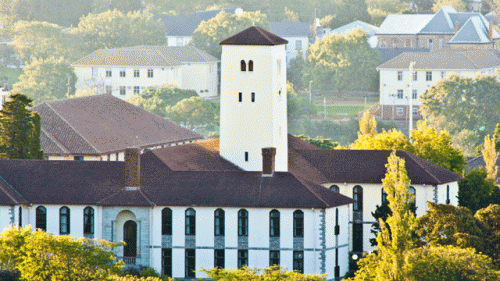
Rhodes University in Grahamstown, Eastern Cape. Photo: Ru.ac.za/S Smith
Rhodes Vice-Chancellor, Sizwe Mabizela, said he was concerned about deteriorating state of hygiene at some halls and pleaded for calm and level-headedness in dealing with the situation.
Rhodes University said that it was “extremely concerned” about the workers’ protest action which took place on campus on Wednesday, despite a peace accord being signed, calling it illegal and unprocedural.
This comes after more than 200 workers on Wednesday staged a protest at the university in Grahamstown, trashing rubbish bins and littering inside and around the main administration building where they had assembled.
This happened despite an agreement the university signed with trade unions “to maintain peace and harmony within the employment relationship” under which unions are required to give 48 hours’ notice before any industrial action commences.
Rhodes management said it did not receive any notice from National Health Education and Allied Workers’ Union (Nehawu) about Wednesday’s protest action, cautioning protesting staff and urging them to report for duty to avoid disciplinary action.
The university said it had noted the adverse impact of the industrial action, which until Tuesday had taken a form of a go-slow on services at some dining halls.
Supporting staff at the university have been on go-slow for weeks after wage negotiations between the university and unions deadlocked.
Nehawu is demanding the improvement of salaries by 7.5 percent across the board, as well as an immediate end of outsourcing, and a housing allowance increase from R1 000 to R1 500 per month, across the board.
Rhodes University has maintained that it cannot afford Nehawu’s demands as a single percentage increase in the remuneration bill would be equivalent to R4 million.
The university has since made a revised salary adjustment offer from five percent to the unions, and the National Tertiary Education Union (NTEU) accepted it.
Another round of negotiations is planned for Wednesday afternoon with Nehawu who rejected it.
Rhodes Vice-Chancellor, Sizwe Mabizela, said he was concerned about deteriorating state of hygiene at some halls and pleaded for calm and level-headedness in dealing with the situation.
“Rhodes is a public institution. We do not answer to any private interests. It would make no sense if the university had money and refused to pay its workers. This is not the case of being unwilling to pay more. There is simply not enough money to cover all the essential operations of our university,” Mabizela said.
“The university has always depended on fee-paying students for its annual income and cash flow. Since 2015, the university carries a multi-million rand debt owing to non-payment of fees by students.”
Mabizela reiterated that the university had embarked on a fundamental reengineering programme which was focussed on the size and shape of the institution.
Various faculties have been requested to review the scheduling of tests and other academic activities to mitigate the impact of the industrial action.
– African News Agency (ANA)

